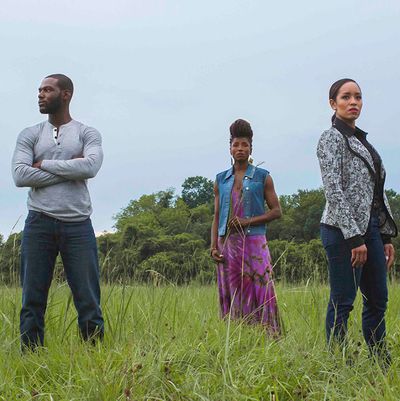
Queen Sugar reinvents the wheel. This story of a fractious family of sugar farmers is a nighttime soap of a sort you’ve seen a dozen times, but never like this. The show is populated mainly by African-American actors and shot on location in and around New Orleans, and the whole thing is presented not in a hyped-up, relentless, network-TV style, but with the slowed-down pace and attentiveness to performance that are hallmarks of a certain kind of indie cinema. Even though the pilot deals with several emotionally huge events in the characters’ lives, and a few more are presented with a touch of silent-movie exaggeration, there are no events in the first few episodes that wouldn’t happen in life. Most of the troubles that the family moves through are variations on things we’ve all experienced, directly or by proxy: the sudden illness of an aged parent; the struggle to raise a child without a partner, and in poverty; the debate over whether to sell a family business or keep it going.
Beyond its still-unusual focus on characters of color, OWN’s Queen Sugar is a regional slice-of-life that takes accents, food, geography, and rituals seriously. It also gives us a wider cross-section of social class than we typically see on TV — and within the same family: the Bordelons, who’ve run a small sugar plantation outside of New Orleans for generations. Sister Charley Bordelon West (Dawn-Lyen Gardner) is rich and lives in Los Angeles with her husband Davis West (Timon Kyle Durrett), team captain of L.A.’s basketball team, the Gladiators; she goes down south to escape the spotlight of a rape scandal that threatens to implicate Davis’s teammates, but ostensibly she’s going there to be with her father, Ernest (Glynn Turman), who’s recovering from a stroke he suffered in the sugar-cane fields. Her sister, Nova (Rutina Wesley, of True Blood and Hannibal), is middle-class and bohemian, an investigative journalist who also does spiritual readings and deals medical marijuana. Brother Ralph Angel (Kofi Siriboe) is an ex-convict and the custodial single father to a son whose drug addict mother has been out of the picture for years.
From a distance, these and other characters might seem like types, but they don’t come off that way because they’re written and acted with conviction and keep revealing unexpected, often contradictory layers to us. Ralph Angel is a man who’ll leave his young son at a park while he robs a convenience store to get money to pay back debts (he seems to owe everybody something), but he won’t accept favors or even the simplest kind of help because it offends his sense of honor. Nova’s lover is married with kids, and she deludes herself into thinking maybe they can live happily ever after; when her editor tries to pressure her to write a first-person “insider” piece about her sister’s husband and his basketball team, she instantly says no and seems offended that he’d even think she’d say yes to such a thing. Charley is often chastised for trying to express love with money and for unilaterally making decisions for her siblings without asking what they want, but when she presses the family to think realistically about the plantation’s future, she makes sense. And we’re always aware that at least half of everything she says or does is driven by what’s going on with her husband’s team.
Based on the 2014 novel by Natalie Baszile, this series is co-created by Oprah Winfrey and director-writer Ava DuVernay (Selma); but the guiding sensibility is pretty clearly that of DuVernay. She directed the first two episodes and established the look and feel for the rest of the show, which is directed exclusively by women. Major plotlines echo situations that she dealt with, albeit in quite a different context, in her independent features I Will Follow (about a woman dealing with her beloved aunt’s cancer diagnosis) and Middle of Nowhere (about a woman who drops out of medical school to focus on her convict husband). If Sundance’s Rectify weren’t airing on a different network, it could be programmed as Queen Sugar’s follow-up. Both shows treat Southerners of all colors not as drawling hatemongers or stooges, but as complicated human beings who don’t really know why they do things. And both series present inherently dramatic situations in a less-than-obvious way, letting important moments play out in a wide shot to give you a bit of distance from the characters’ suffering, or zooming in on a telling detail, like the way a character holds her head up when she absorbs bad news, or the nervous motion of a pair of hands engaged in sorrowful but necessary tasks.
There’s nothing special going on at the plot level; if “older parent suffers medical crisis/family business is thrown into turmoil” isn’t one of the Only Seven Stories You Can Tell, we might as well just go ahead and officially name it the eighth — and I’m sure some viewers will complain that the show’s pace and style are indulgent; Queen Sugar takes its sweet time moving through a moment, lingering where other series tend to sprint, and it is generous with its searching close-ups of faces and hands and its images of the Louisiana countryside at dawn and dusk, an enchanted-seeming landscape of furrowed fields and gnarled, kudzu-covered trees. At its most navel-gazing, the show feels like Parenthood by way of Eugene O’Neill. But tell me you don’t want to watch something like that.
*This article appears in the September 19, 2016, issue of New York Magazine.


